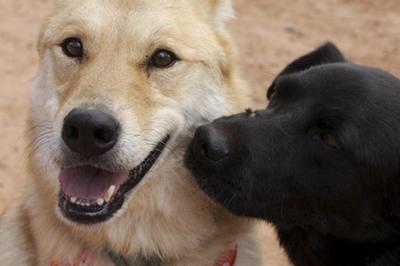
How to Socialize a Dog
For dogs to be happy and comfortable in the world of humans, socialization is so important. Many dogs lack basic social skills — either because of limited exposure to various situations or a lack of positive experiences. Dogs who were raised without sufficient experience with new people, places, sounds, and objects often show fear of many commonplace situations, such as meeting new people. To help avoid this, here are some tips for how to socialize a dog.
When to socialize a dog
It's never too late to socialize a dog. However, exposure to new experiences is especially important when dogs are puppies. Between 3 and 20 weeks of age is the critical socialization period in puppy development. During that period of time, if puppies do not experience a considerable variety of new things in a way that allows them to feel safe and happy, they might become fearful adults.
One of the best ways to leverage this opportunity is to take a puppy to a socialization class with a relationship-based behavior consultant. We can help fearful adult dogs, but socialization of adult dogs can take much longer than it does for puppies.
Dog socialization tips
When socializing your dog — or introducing them to novel experiences — it is crucial to avoid “flooding” them. Overwhelming your dog with lots of something new all at once can create a negative association with that thing or experience, resulting in a lifelong fear.
If a dog has had limited experience with the outside world, any change, such as a move to a new house or city, can be quite a challenge. When dogs like these end up in shelters, they often have a very hard time adjusting to their new environment. They may have been great with their people, even with a few family friends, but when everything in their lives has been turned upside down, they become fearful and antisocial. Unless someone works with them to improve their social skills, they are often deemed to be unsuitable for the role of family pet.
We can help these dogs by teaching them that the world isn’t as scary as it seems. To do this, we must help them experience a variety of things in ways that make them feel safe and happy:
- To help a dog feel safe: Always work at an intensity at which the dog is completely comfortable. You can reduce the intensity of a trigger (whatever new thing you’re introducing the dog to) in different ways, including increasing the distance, duration, size, and volume. Watch the dog’s body language to tell whether they're comfortable. If the dog looks even a little uncomfortable, reduce the intensity of the trigger.
- To help a dog feel happy: Have the trigger predict something that the dog loves, such as a special food treat. Every time the dog experiences the trigger, give them a special treat. With repetition, the dog will start to understand that the presence of the scary thing means that a treat is coming, and they will start to feel better about it.
Use the checklists below to keep track of common experiences you've introduced your dog to — and add experiences tailored to your individual lifestyle.
Introducing dogs to people
People of various ages: | Differences in people: |
___ Newborn to 3 months | ___ Loud man |
___ 3 to 6 months | ___ Loud woman |
___ 6 to 9 months | ___ Ethnic differences |
___ Newly walking toddlers | ___ Using oxygen |
___ 1 year old | ___ Using a cane |
___ 2 years old | ___ Using a walker |
___ More than one toddler at a time | ___ Using a wheelchair |
___ 3 to 4 years old | ___ Other______________________ |
___ Groups of children playing | |
___ Teenagers | |
___ Adults — many different ones | |
___ Seniors — many different ones |
People doing different things: | People wearing different things: |
___ Singing | ___ Hats |
___ Dancing | ___ Glasses |
___ Clapping | ___ Sunglasses |
___ Jumping | ___ A helmet |
___ Hopping | ___ Coats with hood up |
___ Skipping | ___ Capes with hood up |
___ Whistling | ___ Gloves |
___ Jogging | ___ Masks |
___ Other_____________________ | ___ Big boots |
___ Uniforms |
Introducing dogs to other animals
___ Cats | ___ Kittens |
___ Dogs | ___ Puppies |
___ Horses | ___ Small pet animals |
Introducing dogs to household activities
___ Vacuum | ___ Dog nail clippers |
___ Broom | ___ Dog brush and comb |
___ Mop | ___ Sound of electric hair clippers |
___ Alarm clock | ___ Sound of electric fan |
___ TV | ___ Plastic bags flapping |
___ Radio | ___ A balloon with air escaping |
___ Noise-making children’s toys | ___ A recording of storm sounds |
___ Children’s pull toys | ___ A kite |
___ Umbrella (open and close it) | ___ Things being dropped |
___ Other______________________________ |
Home starts with you
Introducing dogs to the outside world
___ Ride in cars | ___ See people on bicycles |
___ Walk on different flooring | ___ See people on skates |
___ Use stairs with and without backs | ___ See people using shopping carts |
___ Walk on bridges | ___ Meet new friends |
___ Visit other people’s homes | ___ Practice visiting the vet's office (give lots of treats) |
___ Take the dog to be groomed | |
___ See and smell parks | |
___ Sit at coffee shop with you | |
___ Use elevators | |
___ Use automatic doors at stores | |
___ Other_______________________ |
